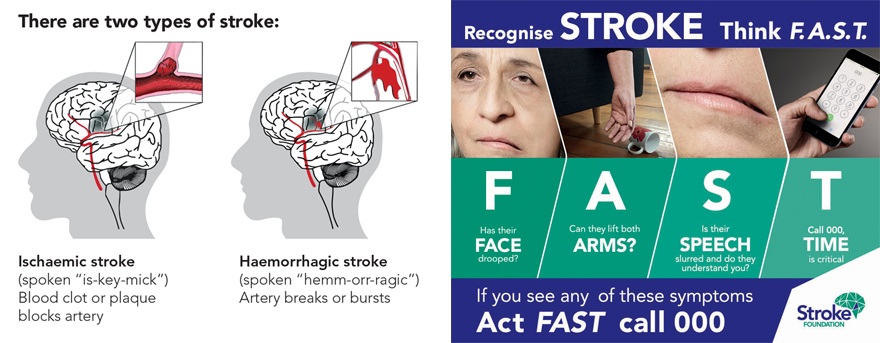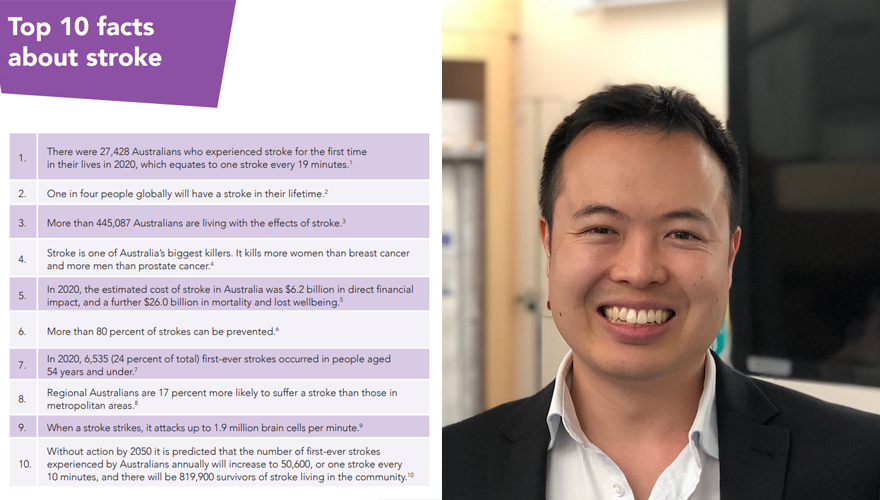
Chances are you or someone you know has been impacted by stroke. It’s an all too familiar story, a person was going about their usual business when, in an instant, stroke strikes changing lives forever. Today, stroke remains one of this country’s biggest killers and a leading cause of disability, yet it can be treated. With the right treatment at the right time it is possible to make a good recovery and live well after stroke.
Stroke attacks the brain, which controls the way we think, move and feel. The truth is, a stroke can happen to any of us, however our stroke risk does increase as we get older. In 2020, its estimated more than 27,000 Australians experienced a stroke for the first time in their lives, that equates to one stroke every 19 minutes. Without action, as our population ages, and our lifestyles become more sedentary the number of strokes experienced by Australians annually is expected to almost double to more than 50,000, equating to one stroke every 10 minutes.
But it does not need to be this way. More than 80 percent of strokes can be prevented. We can all take some simple steps to prevent stroke. It just takes a little know how.
What is a stroke?
Stroke strikes the brain. There are two types of stroke – ischaemic (caused by a blood clot) and haemorrhagic (caused by a burst blood vessel).
When a stroke occurs, the brain is deprived of oxygen and important nutrients. Without oxygen, brain cells immediately start to die at a rate of around 1.9 million a minute. This is why it is vital for stroke to be diagnosed and treated early.
A transient ischaemic attack (TIA) presents in the same way as a stroke, but the signs may only be present for a few minutes. After a TIA your risk of stroke is higher. A TIA is a warning that you may have a stroke and it is an opportunity to prevent this from happening.

Impact of stroke
Every stroke is different depending on what part of the brain the stroke attacks and how severe it is. The impact can include weakness on one side of the body, difficulties swallowing food or drink, personality and behaviour changes, problems with speech and understanding, vision loss, fatigue, depression, anxiety and sensory issues.
What are the risk factors?
Stroke can impact any one of any age, however as we get older our risk increase. Research is also showing there is a growing number of working age people with stroke, largely due to lifestyle factors.
There are risk factors for stroke we can and cannot control. These include:
Risk factors we can control:
- High blood pressure
- High cholesterol
- Atrial fibrillation (irregular heartbeat)
- Smoking
- Obesity
- Diabetes
- Stress
Risk factors we can’t control:
- Age
- Gender
- Family history
Can stroke be prevented?
Most strokes can be prevented. Research shows if high blood pressure alone was eliminated, the number of strokes experienced would be practically halved (48 percent).
The best place to start in managing your stroke risk is a visit to your local doctor for a blood pressure check. High blood pressure is the greatest modifiable risk factor for stroke, yet it has no immediate symptoms. It can be managed through medication and adopting a healthy, active lifestyle.
Stroke risk can also be reduced by lowering cholesterol, avoiding sugary drinks, cutting salt intake, exercising regularly, only drinking alcohol in moderation and not smoking.
In an added bonus, taking these steps will also reduce your risk of other chronic conditions including heart disease and diabetes.
Recognising a stroke F.A.S.T
Stroke is always a medical emergency but there are time-critical treatments that can be administered: that is why the patient must get to hospital for a brain scan and diagnosis immediately after symptoms develop. The only way these steps can happen is if the stroke symptoms are recognised in the first place. The Stroke Foundation encourages all Australians to learn and remember the most common signs of stroke F.A.S.T.
If you suspect a stroke, ask these questions:
- Face – Check their face. Has their mouth drooped?
- Arms – Can they lift both arms?
- Speech – Is their speech slurred? Do they understand you?
- Time – time is critical. If you see any of these signs call triple zero (000) straight away.
Think F.A.S.T. and act FAST. Dial triple zero (000) at the first sign of stroke.
There are some other signs of stroke to look out for.
This information is also available in Arabic, Chinese – traditional, Chinese – simplified, Vietnamese, Greek, Korean, Hindi and Italian.
Impacts of COVID-19 on stroke
Australians are being warned not to play down or ignore medical emergencies like strokes during the coronavirus (COVID-19) pandemic. Although we are living in unprecedented times, essential services are still running in our hospitals and every precaution is being taken to protect patients and their families.
Don’t wait until it’s too late if you suspect a stroke. Take action and call triple zero (000) at the first sign.

Stroke Foundation Clinical Council member Dr Timothy Ang
Rehabilitation
Recovery from stroke is a long journey that continues well beyond the moment a patient leaves hospital. Stroke Foundation has a number of services available to help make that journey easier for survivors of stroke and their families.
My Stroke Journey
My Stroke Journey is a booklet containing everything survivors and carers need to know about stroke to help the transition from hospital to home and onto recovery.
StrokeLine (1800 STROKE)
StrokeLine is staffed by health professionals who provide information and advice on stroke prevention,
treatment and recovery.
EnableMe
EnableMe is a website dedicated to helping survivors of stroke with their recovery by connecting them to
an online community and providing expert information, videos, podcasts and other resources.
Stroke Foundation’s mission is to prevent stroke, save lives and enhance recovery. If you would like to donate to support our programs and help survivors of stroke and their families thrive, that would be highly appreciated.
This is a sponsored article produced in partnership with Stroke Foundation.






